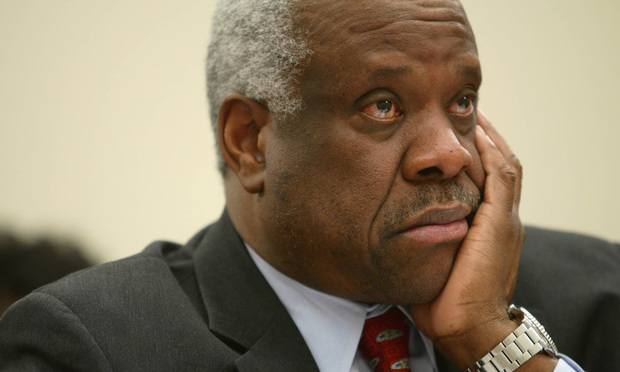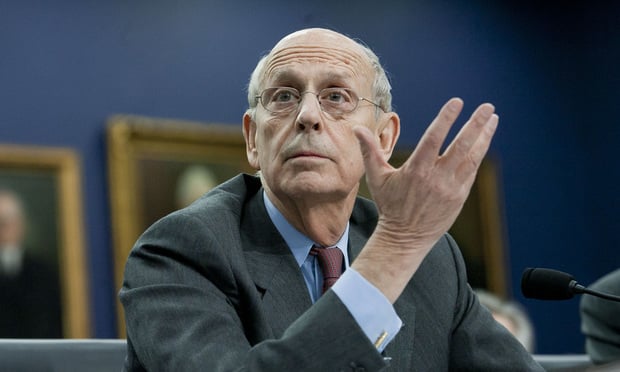'Regrettable.' 'First Time Ever.' 'Inventing.' How Justices Fumed Over Census Ruling
"The court's holding reflects an unprecedented departure from our deferential review of discretionary agency decisions," Justice Clarence Thomas said in dissent.
June 27, 2019 at 05:12 PM
6 minute read
 Justice Clarence Thomas (2013). Credit: Diego M. Radzinschi / ALM
Justice Clarence Thomas (2013). Credit: Diego M. Radzinschi / ALM
The U.S. Supreme Court's refusal to allow the Trump administration to put a citizenship question on the 2020 census drew a breadth of writing from the justices.
Chief Justice John Roberts Jr., joined by liberal colleagues, found the government's reasoning “contrived.” But the ruling still allows the U.S. Commerce Department, which oversees the census, to take another shot at arguing why the addition of the question is necessary.
Meanwhile, conservative justices, including Clarence Thomas and Samuel Alito Jr., panned a decision that they said went too far in questioning the Commerce agency and its leader Wilbur Ross. Thomas, for one, accused the court of “inventing” principles to form the basis of the majority ruling.
What follows are highlights from some of the more biting passages from the opinion in Department of Commerce v. New York.
>> Chief Justice John Roberts Jr.: “Altogether, the evidence tells a story that does not match the explanation the Secretary gave for his decision. In the secretary's telling, Commerce was simply acting on a routine data request from another agency. Yet the materials before us indicate that Commerce went to great lengths to elicit the request from DOJ (or any other willing agency). And unlike a typical case in which an agency may have both stated and unstated reasons for a decision, here the VRA enforcement rationale—the sole stated reason—seems to have been contrived.”
>> Roberts: “We do not hold that the agency decision here was substantively invalid. But agencies must pursue their goals reasonably. Reasoned decisionmaking under the Administrative Procedure Act calls for an explanation for agency action. What was provided here was more of a distraction.”
>> Justice Clarence Thomas: “For the first time ever, the court invalidates an agency action solely because it questions the sincerity of the agency's otherwise adequate rationale. Echoing the din of suspicion and distrust that seems to typify modern discourse, the court declares the secretary's memorandum 'pretextual' because, 'viewing the evidence as a whole,' his explanation that including a citizenship question on the census would help enforce the Voting Rights Act 'seems to have been contrived.' The court does not hold that the secretary merely had additional, unstated reasons for reinstating the citizenship question. Rather, it holds that the secretary's stated rationale did not factor at all into his decision.”
>> Thomas: “The court's holding reflects an unprecedented departure from our deferential review of discretionary agency decisions. And, if taken seriously as a rule of decision, this holding would transform administrative law. It is not difficult for political opponents of executive actions to generate controversy with accusations of pretext, deceit, and illicit motives. Significant policy decisions are regularly criticized as products of partisan influence, interest group pressure, corruption, and animus. Crediting these accusations on evidence as thin as the evidence here could lead judicial review of administrative proceedings to devolve into an endless morass of discovery and policy disputes not contemplated by the Administrative Procedure Act (APA).”
>> Justice Samuel Alito Jr.: “It is a sign of our time that the inclusion of a question about citizenship on the census has become a subject of bitter public controversy and has led to today's regrettable decision. While the decision to place such a question on the 2020 census questionnaire is attacked as racist, there is a broad international consensus that inquiring about citizenship on a census is not just appropriate but advisable. No one disputes that it is important to know how many inhabitants of this country are citizens. And the most direct way to gather this information is to ask for it in a census.”
>> Alito: “Throughout our nation's history, the executive branch has decided without judicial supervision or interference whether and, if so, in what form the decennial census should inquire about the citizenship of the inhabitants of this country. Whether to put a citizenship question on the 2020 census questionnaire is a question that is committed by law to the discretion of the Secretary of Commerce and is therefore exempt from APA review. The district court had the authority to decide respondents' constitutional claims, but the remainder of their complaint should have been dismissed.”
 Justice Stephen Breyer testifies in 2015. Photo by Diego M. Radzinschi/THE NATIONAL LAW JOURNAL
Justice Stephen Breyer testifies in 2015. Photo by Diego M. Radzinschi/THE NATIONAL LAW JOURNALJustice Stephen Breyer, joined by Justices Sonia Sotomayor, Elena Kagan and Ruth Bader Ginsburg, said the Supreme Court should have outright declared the addition of the citizenship question violated the Administrative Procedure Act.
>> Justice Stephen Breyer: “The secretary's failure to consider this evidence—that adding the question would harm the census count in the interest of obtaining less accurate citizenship data—provides a sufficient basis for setting the decision aside. But there is more. The reason that the secretary provided for needing more accurate citizenship information in the first place—to help the DOJ enforce the Voting Rights Act—is unconvincing.”
>> Breyer: “The secretary thus failed to 'articulate a satisfactory explanation' for his decision, 'failed to consider . . . important aspect[s] of the problem,' and 'offered an explanation for [his] decision that runs counter to the evidence,' all in violation of the APA. These failures, in my view, risked undermining public confidence in the integrity of our democratic system itself.”
Read more:
Roberts, Ruling Against Trump, Faces New Round of Conservatives' Criticism
Kagan Writes Stinging Dissent as Court Sidesteps Politically Rigged Election Maps
Justices, Blocking Citizenship Question on Census, Call Trump's Push 'Contrived'
US Appeals Court Says Census Plaintiffs Can Explore New Evidence
Justices, Appearing Divided, Weigh Legality of Adding Census Citizenship Question
This content has been archived. It is available through our partners, LexisNexis® and Bloomberg Law.
To view this content, please continue to their sites.
Not a Lexis Subscriber?
Subscribe Now
Not a Bloomberg Law Subscriber?
Subscribe Now
NOT FOR REPRINT
© 2025 ALM Global, LLC, All Rights Reserved. Request academic re-use from www.copyright.com. All other uses, submit a request to [email protected]. For more information visit Asset & Logo Licensing.
You Might Like
View All
Will GOP-Led Senate, House Move to Repeal Biden's Late Regulations as Law Provides?

US Supreme Court Weighs Federal Agencies' Duty Under National Environmental Policy Act

FDA Defends Rejection of Vape-Flavor Applications Before Sympathetic Supreme Court

'Nuclear Option'?: Eli Lilly Taps Big Law Firms in Federal Drug Pricing Dispute
3 minute readTrending Stories
- 1Uber Files RICO Suit Against Plaintiff-Side Firms Alleging Fraudulent Injury Claims
- 2The Law Firm Disrupted: Scrutinizing the Elephant More Than the Mouse
- 3Inherent Diminished Value Damages Unavailable to 3rd-Party Claimants, Court Says
- 4Pa. Defense Firm Sued by Client Over Ex-Eagles Player's $43.5M Med Mal Win
- 5Losses Mount at Morris Manning, but Departing Ex-Chair Stays Bullish About His Old Firm's Future
Who Got The Work
J. Brugh Lower of Gibbons has entered an appearance for industrial equipment supplier Devco Corporation in a pending trademark infringement lawsuit. The suit, accusing the defendant of selling knock-off Graco products, was filed Dec. 18 in New Jersey District Court by Rivkin Radler on behalf of Graco Inc. and Graco Minnesota. The case, assigned to U.S. District Judge Zahid N. Quraishi, is 3:24-cv-11294, Graco Inc. et al v. Devco Corporation.
Who Got The Work
Rebecca Maller-Stein and Kent A. Yalowitz of Arnold & Porter Kaye Scholer have entered their appearances for Hanaco Venture Capital and its executives, Lior Prosor and David Frankel, in a pending securities lawsuit. The action, filed on Dec. 24 in New York Southern District Court by Zell, Aron & Co. on behalf of Goldeneye Advisors, accuses the defendants of negligently and fraudulently managing the plaintiff's $1 million investment. The case, assigned to U.S. District Judge Vernon S. Broderick, is 1:24-cv-09918, Goldeneye Advisors, LLC v. Hanaco Venture Capital, Ltd. et al.
Who Got The Work
Attorneys from A&O Shearman has stepped in as defense counsel for Toronto-Dominion Bank and other defendants in a pending securities class action. The suit, filed Dec. 11 in New York Southern District Court by Bleichmar Fonti & Auld, accuses the defendants of concealing the bank's 'pervasive' deficiencies in regards to its compliance with the Bank Secrecy Act and the quality of its anti-money laundering controls. The case, assigned to U.S. District Judge Arun Subramanian, is 1:24-cv-09445, Gonzalez v. The Toronto-Dominion Bank et al.
Who Got The Work
Crown Castle International, a Pennsylvania company providing shared communications infrastructure, has turned to Luke D. Wolf of Gordon Rees Scully Mansukhani to fend off a pending breach-of-contract lawsuit. The court action, filed Nov. 25 in Michigan Eastern District Court by Hooper Hathaway PC on behalf of The Town Residences LLC, accuses Crown Castle of failing to transfer approximately $30,000 in utility payments from T-Mobile in breach of a roof-top lease and assignment agreement. The case, assigned to U.S. District Judge Susan K. Declercq, is 2:24-cv-13131, The Town Residences LLC v. T-Mobile US, Inc. et al.
Who Got The Work
Wilfred P. Coronato and Daniel M. Schwartz of McCarter & English have stepped in as defense counsel to Electrolux Home Products Inc. in a pending product liability lawsuit. The court action, filed Nov. 26 in New York Eastern District Court by Poulos Lopiccolo PC and Nagel Rice LLP on behalf of David Stern, alleges that the defendant's refrigerators’ drawers and shelving repeatedly break and fall apart within months after purchase. The case, assigned to U.S. District Judge Joan M. Azrack, is 2:24-cv-08204, Stern v. Electrolux Home Products, Inc.
Featured Firms
Law Offices of Gary Martin Hays & Associates, P.C.
(470) 294-1674
Law Offices of Mark E. Salomone
(857) 444-6468
Smith & Hassler
(713) 739-1250








